November 17, 2024 | 09:52 GMT +7
November 17, 2024 | 09:52 GMT +7
Hotline: 0913.378.918
November 17, 2024 | 09:52 GMT +7
Hotline: 0913.378.918
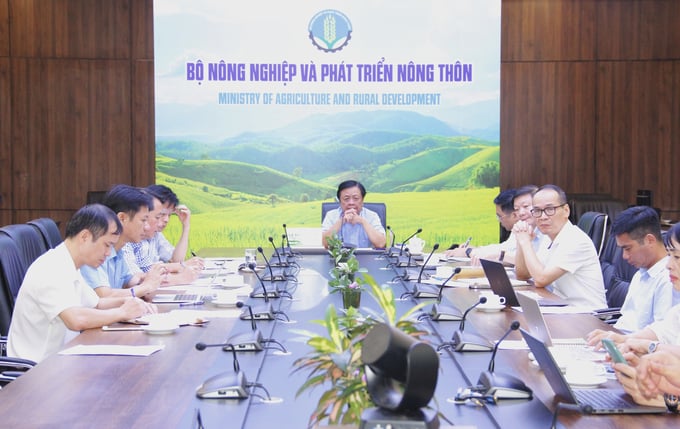
The Ministry of Agriculture and Rural Development held a meeting on August 6 to evaluate the results of the Sustainable Forestry Development Program and make preparations for the years betweeen 2026 and 2030. Photo: Trung Quan.
Tran Quang Bao, General Director of the Department of Forestry, reported positive outcomes from the implementation of key forestry programs and plans. Bui Chinh Nghia, General Director of the Department of Forest Protection, noted that the current global forest coverage is estimated at 28%; whereas Vietnam's forest coverage stands at 42.02%, placing it among the countries with the highest forest coverage worldwide. Vietnam has maintained its natural forest area through various measures including forest regeneration and restoration. Notably, several regions have reported an increase in natural forest areas.
However, Vietnam faces significant challenges in the implementation process. Local planning issues and ongoing violations of forest protection regulations stand as outstanding obstacles. On the other hand, the implementation and management of Program 809 and Sub-project 1 at the local level is restricted by limited capacity at the commune level. Forest owners in areas II and III (non-impoverished Kinh households) have reported not receiving support for forest protection.
With the goal of ensuring the successful implementation of the Sustainable Forestry Development Program, Deputy Minister Nguyen Quoc Tri requested the Department of Forestry to achieve the following key goals by 2025: consolidate all costs and implementation plans from local governments for submission to the Ministry of Finance and the Ethnic Affairs Committee; manage operations to meet targets and establish appropriate criteria. Deputy Minister Nguyen Quoc Tri highlighted the most critical issue as the development of legal documents with suitable mechanisms and policies to address practical challenges.
Additionally, the Department of Forest Protection and the Department of Forestry should coordinate and organize inspection (with a minimum of 10 inspections per year) and audit teams to effectively carry out state management functions.
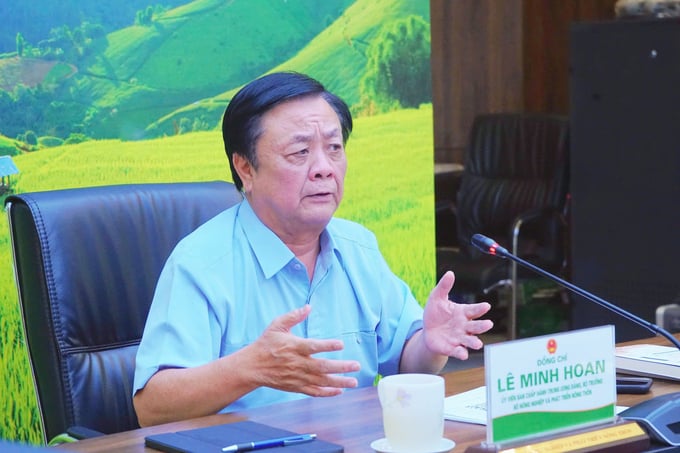
Forest research and biodiversity are the current areas of focus for Minister Le Minh Hoan. Photo: Trung Quan.
In preparation for the years between 2026 and 2030, Deputy Minister Nguyen Quoc Tri proposed integrating forest protection into regular programs; thereby enabling the Ministry of Finance to provide annual funding to local govenrment, guaranteeing timely disbursement. Deputy Minister Tri suggested strengthening communication efforts and developing a comprehensive implementation guideline to increase the scope of the program.
Under the guidance of the Ministry of Agriculture and Rural Development, the Department of Forest Protection has committed to collaborating with local agencies to enhance forest management, protection, and fire prevention. Additionally, stakeholders will focus on raising the awareness and responsibility of provincial leadership and local communities, with an emphasis on sustainable forestry development based on three main key aspects: economy, society, and environment.
Minister of Agriculture and Rural Development Le Minh Hoan noted that maintaining income levels for forestry personnel between 2026 and 2030 is essential to supporting forest owners and achieving sustainable forest management goals. Accordingly, the Ministry will prioritize the forestry sector, using government interest as a marketing tool to attract resources from both domestic and international businesses. In addition, the Ministry will outline the objectives for mobilizing capital, thereby enabling the development of an investment attraction policy.
On the other hand, Minister Le Minh Hoan emphasized the importance of forest research and biodiversity. Namely, the Ministry will implement scientific and technological programs to advance research on new issues, opening opportunities for future project development.
Europe is a major market for 354 businesses from the wood industry in Binh Dinh; however, the EU Deforestation Regulation (EUDR) poses a significant challenge for the local wood industry.
The European Union Deforestation Regulation (EUDR) includes three key points: products must not be produced from materials causing deforestation or forest degradation after December 31, 2020; the production process must comply with the laws of the country of origin; geolocation information for harvesting sites are mandatory; and a due diligence system must be enforced to authenticate compliance with the laws of the country of origin.
On the other hand, the National Forest Certification System was established by the Ministry of Agriculture and Rural Development in 2019 based on the Prime Minister’s Decision No. 1288/QD-TTg in 2018. Accordingly, the production process is subject to two primary groups of standards: the Sustainable Forest Management Standard (VFCS/PEFC) and the Product Chain of Custody Standard (PEFC CoC).
Translated by Nguyen Hai Long

(VAN) The training class provides knowledge for trainers on communication work as well as policies and solutions in the work of recovering, protecting, and developing cranes.
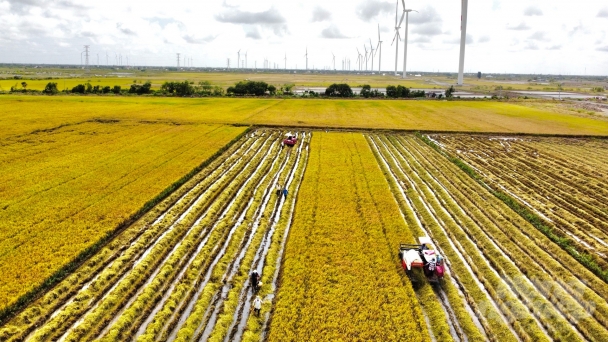
(VAN) Bac Lieu will implement the production of 28.000 hectares of specialized high-quality, low-emission rice, with the goal of increasing the area to around 46.000 hectares by 2030.
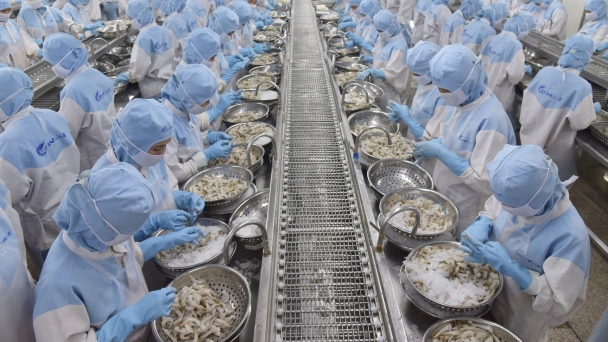
(VAN) The emissions per kilogram of shrimp in small-scale processing facilities are higher than those in large-scale facilities.
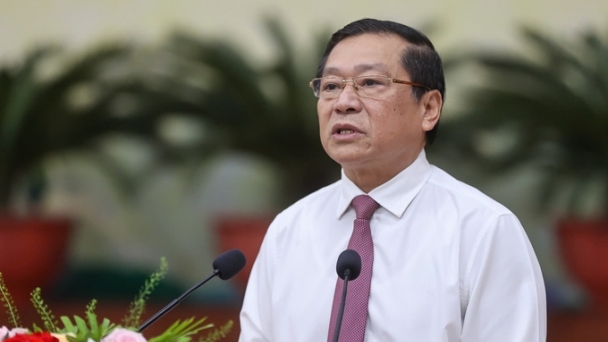
(VAN) The national scientific conference "A new era of Vietnam's rise – Theoretical and practical issues" took place on the morning of November 15.
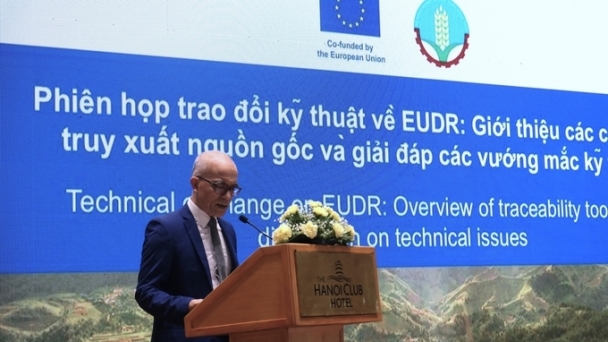
(VAN) The technical seminar on EUDR in Hanoi emphasizes international cooperation, promoting sustainable and transparent supply chains to meet EU regulations.
/2024/11/15/5518-2-204727_913.jpg)
(VAN) Tra Que Vegetable Village has surpassed more than 260 registration documents from 60 countries to be honored as the world's best tourist village in 2024.
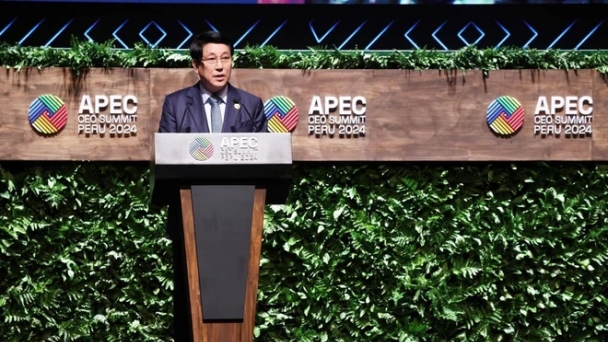
(VAN) During his speech at the APEC CEO Summit 2024, President Luong Cuong emphasized that Vietnam is entering a new era with a renewed mindset.